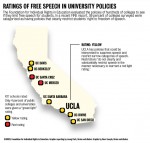A report released in January claims some UCLA policies restrict students’ right to free speech on campus.
The Foundation for Individual Rights in Education, a nonprofit group that has released the report annually since 2006, examined 427 schools in its survey. The foundation gave UCLA, along with 151 other schools, including other University of California campuses, a “yellow light” because it has policies “that could be interpreted to suppress protected speech.”
Several UCLA policies were scored individually and averaged into an overall rating. Robert Naples, UCLA’s associate vice chancellor and dean of students, said he is not overly concerned with the score because newer policies have received a green light. He said balancing everyone’s rights remains a delicate matter for the university.
“That becomes a little bit more difficult for students than sometimes they can appreciate,” Naples said. “It’s a delicate balance but I am pretty comfortable with where we stand.”
FIRE said UCLA’s definition of sexual harassment in its sexual harassment brochure as “unwelcome advances and requests for sexual favors” and actions that create a “hostile environment” may set too broad of a definition.
Pamela Thomason, UCLA’s Title IX coordinator, said the brochure does not represent the university’s official policy and the boundary of what constitutes harassment set by the university is clear. She said the university addresses severely abusive sexual conducts, as defined by the Supreme Court.
Samantha Harris, FIRE’s director of policy research and primary author of the report, said in an email that, while the university’s official policy does not interfere with students’ free speech rights, having multiple documents related to sexual harassment with multiple definitions can confuse students.
The foundation said UCLA’s definition of bias was overreaching, which could inhibit students’ freedom of speech. The university specifies bias as “any demeaning, derogatory, or otherwise offensive behavior … on the basis of race, gender, ethnicity, sexual orientation, religion or other group characteristics.”
It also found that the anonymous reporting of activities that violate UCLA’s Principles of Community may infringe on students’ right to due process because it denies students the right to confront their accusers.
FIRE has classified UCLA in the “yellow” category since 2010. Before 2010, UCLA received a “red light” rating, with a 2009 report saying that the university had “clearly and substantially” restricted freedom of speech.
In the report, 250 out of 427 schools were given a “red light” rating. Currently, schools such as UC Santa Cruz and UC Merced are rated as schools with a “red light.”
UCLA previously received a “red light” rating because the foundation found its Office of Residential Life’s Community Standards to be too broad. The standards said “(the office) will not tolerate any form of bigotry, threats, intimidation, violence or other forms of harassment against any member of our community. In the same manner, we will not accept ignorance, humor, (or) anger ... as an excuse.”
The standards have since been replaced by other documents.
The foundation’s most recent report noted that the California Education Code prevents California’s public and private universities from restricting students’ right to protected speech as defined by the First Amendment. The code excludes obscenity and true threats.
The code states that any students enrolled in California universities can bring a civil lawsuit against policies that restrict their right to free speech. In 2012, Occupy UC Davis students who were pepper-sprayed by UC police during a nonviolent protest sued, and eventually won a $1 million settlement against the UC.
UC spokeswoman Brooke Converse said the University has not read the foundation’s report and cannot comment on it.
Naples said UCLA is taking a number of steps to preserve students’ right to free speech while preserving a safe environment for diverse groups of students.
He added that while he may personally disagree with some speeches made on campus, it is his and the university’s responsibility to defend students’ right to protected free speech no matter how offensive it can be.
“I find myself often in the position of where I am defending a speech that I can’t stand, but it’s within the constitutionally protected right of students and others to say it,” Naples said.
The Office of Student Affairs created a document this school year outlining students’ First Amendment rights on campus. Naples said the document is available online and in places such as the university police department’s office.
“All those ideas (in the document) were not new ideas, but one of the things we were concerned about was trying to put all those ideas into one easily accessible, student document,” Naples said.
Naples added that the office regularly consults experts on free speech rights and constantly adapts its policies to court cases and different laws that modify the regulations.
UCLA has faced a few incidents concerning free speech in recent years.
After facing complaints from a Christian group, the UCLA Center for Student Programming – now Student Organizations, Leadership & Engagement – modified its student group flier policy in June 2012 to remove the provision that banned student groups from posting materials promoting “demeaning social stereotypes.”
James Enstrom, a former non-tenured faculty researcher in the UCLA Fielding School of Public Health, filed a federal lawsuit in 2012 against the UC and several UCLA administrators saying he was dismissed from his position because of his controversial research on air pollution and secondhand smoke. The lawsuit is still ongoing.
The foundation said in its annual report on free speech that it remains optimistic about the future. The number of universities with restrictive speech policies that receive a “red light” has gone down by about 17 percent in six years, according to the report.
